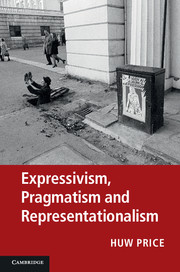8 - Prospects for global expressivism
Published online by Cambridge University Press: 05 July 2013
Summary
In this chapter I want to try to bring into sharper focus the distinctive marks of the kind of pragmatist position advocated in three lectures in Chapters 1, 2 and 3 – global expressivism, as I called it in Lecture 2 – and its relation to various other pragmatist and expressivist positions on the one side, and certain self-avowedly ‘realist’ positions on the other. Aside from the possible benefits of some unanticipated temporal distance, my main resource for this task lies in the challenges and insights of the four essays by Simon Blackburn, Michael Williams, Paul Horwich and Robert Brandom (to list them in the order in which I shall reply to them below), in Chapters 4, 7, 6 and 5, respectively. In this chapter I want to respond to some of those challenges and exploit some of these authors' insights.
OVERVIEW
The chapter goes like this. The differences between my proposed ‘global’ expressivism and its ‘local’ ancestors turn mainly on my rejection, or modification, of the so-called bifurcation thesis – the claimed distinction between descriptive and non-descriptive uses of declarative utterances. In order to be able to highlight these differences, I shall begin with that thesis. I shall also re-emphasise the distinctively two-level character that I take to be one of the defining features of the kind of pragmatism I am recommending. This two-level character is certainly not unique to my version of pragmatism – on the contrary, as I emphasise both in the lectures and below, the two-level structure is certainly present, at least in some form, in the views of the pragmatists from whom I take inspiration (including, especially, both Brandom and Blackburn).
- Type
- Chapter
- Information
- Expressivism, Pragmatism and Representationalism , pp. 147 - 194Publisher: Cambridge University PressPrint publication year: 2013
- 8
- Cited by



